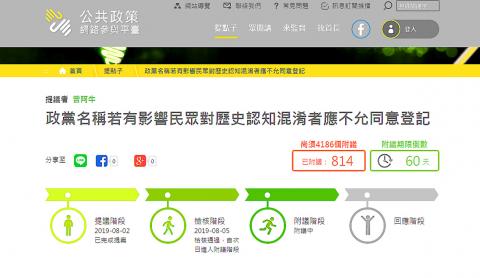A petition to block Taipei Mayor Ko Wen-je (柯文哲) from registering his political party under the name Taiwan People’s Party (台灣民眾黨) passed its initial legal review, the online public policy platform showed yesterday.
From its launch on Friday last week to press time last night, the petition had gathered 1,115 signatures. It must collect 5,000 signatures by Oct. 5 to require the government to issue an official response, according to join.gov.tw.
The petition’s sponsor, former Tainan deputy mayor Tseng Hsu-cheng (曾旭正), has said that Ko should not be allowed to “muddle history” by reusing the name of the party that Taiwanese democracy pioneer Chiang Wei-shui (蔣渭水) founded in 1927.

Photo: Hung Jui-ching, Taipei Times
Following yesterday’s announcement, Tseng on Facebook called on the public to sign the petition, saying that the news was a “gift” for Ko after his convention to found the party was officially formed earlier yesterday.
“A politician has proposed registering a new political party under the name Taiwan People’s Party, while bearing no resemblance in purpose, spirit or character to the Taiwan People’s Party of the past century or its founder, Chiang,” the petition reads. “It is deeply inappropriate to allow the machinations of politicians to mislead innocent members of the public in their understanding of history.”
The Ministry of Culture should explain the historical relevance of Chiang’s movement, while the Ministry of the Interior should amend the Political Parties Act (政黨法) to close the loophole that would allow Ko to use the name, it says.
The petition would “protect a historical and cultural heritage from pollution” and “ensure that the farcical plagiarism of history by political parties will not repeat itself,” the organizers said.
Under the act, the name or abbreviation of a political party should not be similar or identical to a political party that has already been established, have potential for confusion with a governmental or nonprofit organization, or incite discrimination or hatred.
It also stipulates that the responsible agency should establish a body to arbitrate “doubts or concerns ... regarding a political party’s disciplinary actions, name, abbreviation or emblem, or other related matters.”
The Ministry of the Interior would convene a committee to review Ko’s application if the petition obtains the necessary number of signatures, a source said on condition of anonymity.

Alain Robert, known as the "French Spider-Man," praised Alex Honnold as exceptionally well-prepared after the US climber completed a free solo ascent of Taipei 101 yesterday. Robert said Honnold's ascent of the 508m-tall skyscraper in just more than one-and-a-half hours without using safety ropes or equipment was a remarkable achievement. "This is my life," he said in an interview conducted in French, adding that he liked the feeling of being "on the edge of danger." The 63-year-old Frenchman climbed Taipei 101 using ropes in December 2004, taking about four hours to reach the top. On a one-to-10 scale of difficulty, Robert said Taipei 101

Taiwanese and US defense groups are collaborating to introduce deployable, semi-autonomous manufacturing systems for drones and components in a boost to the nation’s supply chain resilience. Taiwan’s G-Tech Optroelectronics Corp subsidiary GTOC and the US’ Aerkomm Inc on Friday announced an agreement with fellow US-based Firestorm Lab to adopt the latter’s xCell, a technology featuring 3D printers fitted in 6.1m container units. The systems enable aerial platforms and parts to be produced in high volumes from dispersed nodes capable of rapid redeployment, to minimize the risk of enemy strikes and to meet field requirements, they said. Firestorm chief technology officer Ian Muceus said

MORE FALL: An investigation into one of Xi’s key cronies, part of a broader ‘anti-corruption’ drive, indicates that he might have a deep distrust in the military, an expert said China’s latest military purge underscores systemic risks in its shift from collective leadership to sole rule under Chinese President Xi Jinping (習近平), and could disrupt its chain of command and military capabilities, a national security official said yesterday. If decisionmaking within the Chinese Communist Party has become “irrational” under one-man rule, the Taiwan Strait and the regional situation must be approached with extreme caution, given unforeseen risks, they added. The anonymous official made the remarks as China’s Central Military Commission Vice Chairman Zhang Youxia (張又俠) and Joint Staff Department Chief of Staff Liu Zhenli (劉振立) were reportedly being investigated for suspected “serious

American climber Alex Honnold is to attempt a free climb of Taipei 101 today at 9am, with traffic closures around the skyscraper. To accommodate the climb attempt and filming, the Taipei Department of Transportation said traffic controls would be enforced around the Taipei 101 area. If weather conditions delay the climb, the restrictions would be pushed back to tomorrow. Traffic controls would be in place today from 7am to 11am around the Taipei 101 area, the department said. Songzhi Road would be fully closed in both directions between Songlian Road and Xinyi Road Sec 5, it said, adding that bidirectional traffic controls would